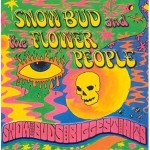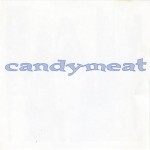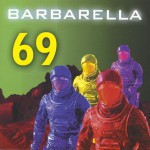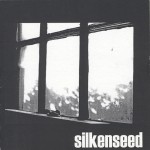 Snow Bud and the Flower People
Snow Bud and the Flower People
Snow Buds Biggest Hits
Flying Heart Records
When, at last, the day finally arrives that our fair city sees fit to honor the legacy of her local musicians with a Portland Music Hall of Fame, among the first honorees, such as the underrated: Mel Brown and Leroy Vinnegar, the obvious: Steve Bradley, Jon Koonce and Paul Delay and the inevitable: Billy Rancher, Marv and Rindy, John and Valerie; a small statue should be erected to the pioneering triumvirate of the Portland underground scene— Greg Sage, Fred Cole and, of course, Chris Newman. Anyone looking to trace the roots of the vaunted Grunge movement would inevitably find those three musicians at the very base of the trunk of that family tree.
And anyone looking to find antecedents to the oeuvre of Kurt Cobain need look no further than this score of songs, crafted as a smirking tribute to the glories of smoking marijuana. Recorded in 1986 on a Teac 4-track, reel-to- reel, in a basement studio in Kalama, not far from Chris’ hometown of Longview, Washington, the album was originally available only as a dual-length cassette. This long-awaited CD version, splendidly remastered by Mike Demmers of Desitrek Studios, confers greatness upon the entire project; from its humble origins to its glossy finish.
But, what is most clearly evident on this nearly-fifteen-year-old recording are Newman’s remarkable abilities as a guitar stylist and songwriter; as well as his unique and robust vocal talent. Ranging in styles from primordial Grunge, to Surf to Swing Jazz, to Blues, from ‘60s Psychedelia, to Garage Rock, to ukulele-driven Hawaiian, each song fairly oozes with Chris’ incredible artistic sensibilities. In every case, he is spot-on in his clever instrumental arrangements and smart vocal deliveries. There is probably in existence no truer, nor more succinct catalog, of such depth and breadth, of Chris Newman’s work.
The album kicks off with the cult-classic, “Bong Hit.” Chunky rhythm guitars propel the tune, as Chris’ lead guitar whines like a cat in heat. His voice, a deep croak, gives evidence of his indulgence in the topic. The bridge begins a series of actual anti-drug (with the obvious exception) tirades which extends through several of the songs: “Don’t drink much whisky/Cocaine is a drag/Pass the bong, you can’t go wrong/13 is my bag.” Fifteen years after the fact, this song is still a home run. Out of the park.
“Grass Is Groovy,” “Peakin’,” “Spaced Out” and “Hassan” explore somewhat similar, stony terrains. The two former tracks are vintage pieces of ‘60s-like Psychedelia, with numerous aural allusions to the work of the Doors and the Jefferson Airplane. The latter two, especially, are middle-eastern pentatonic send-ups of the highest order. “Killer Bud” returns to the Grunge splendor of “Bong Hit.” A litany of the world’s finest weeds (in the tradition of “Nobody But Me” by the Human Beinz and all the Beach Boys’ “car” songs) ensues, with none of the competition comparing, of course, to the aforementioned homicidal stuff. Another masterpiece.
Coming in like Grunge from a different era, “Rat Fink” echoes musical themes heard in seminal ‘60s bands such as the Sonics and Paul Revere and the Raiders, while delineating the tale of a drug bust and the resultant feelings of defiance. such an occurrence can sometimes engender. A tender ballad , “Mary Jane Brown,” extols the virtues of Chris’ true love in way that mirrors Cab Calloway’s ‘20s number, “Sweet Marijuana Brown.” “Spacin’ Mason,” a Jazz inflected Blues tune, is swathed in lush slide guitar sweeps and perky lead guitar injections, as lyrically, Chris refers to a lost soul, who makes another appearance later in the set.
While decrying the paucity of available smoking materials, Chris invokes The Capitols’ “Cool Jerk,” with a signature Funky guitar figure on “No Shake.” But the uptempo arrangement belies the desperation exhibited in the lyrics, which find our hero sorting through seeds, stems, tar-laden roach papers and pipe scrapings in an effort to attain the unattainable. The Doors’ “Love Street” comes to mind on “Seeds For Thought.” A buzzy, Electric Prunes-ish fuzz lead guitar is layered over dripping, wah guitar arpeggios to create a jaunty, mind-bending mood. A well-placed backwards guitar segment at the end of the song adds the perfect touch.
“Bummin’ From Mom” is a less lighthearted look at the unfortunate plight of destitution, just as a “new shipment” is expected to arrive in town. Citing Black Sabbath’s “War Pigs” as its instrumental source, the lyric contends with our hero’s strategy in his plot to solicit funds from his mother. “I waited all morning till the old man went to work/I don’t want to listen to him calling me a jerk/Pulled around the corner in my van/I’m thinking of excuses, making a plan/I know what’s expected from a burnout like me/I should be a foreman down at the factory/Yeah, I cut my hair, but I don’t care, I just like to watch tv/She’s making dinner— my mom takes care of me.”
A paranoid, bluesy protest song, “Dope Famine” makes the interestingly homonymic observation that “The CIA has seen I ain’t.” Chris adds Creamy Eric Clapton edges to his guitar work on “Thaied Up,” a blustery burner. “Now I know I must surely fry/I want a little more of that chubby little guy/I’m all thaied up and I can’t get loose/I got little buddha on my caboose.” The ukulele driven plaint of “Blue Hawaiian” creates a lazy, palmtrees swaying, motif that is nicely augmented by touches of slack key-like slide guitar. Coming on like Dick Dale, surfing a wave of blue smoke, Chris throws down the gauntlet in “Dick In The Dirt,” challenging all comers to a veritable “smokeout” at the OK Corral. So to speak.
“Black Congo” is probably the least successful song of the twenty. A stilted jungle beat helps to heighten the sense that Chris may be out of his element when trying to explain African tribal customs in regards to Elephant Weed. Still the song has its quirky appeal. The cautionary tale “Speed Freak,” is another four-bagger. Overdriven speed-metal guitars roil and boil in a cauldron of molten wrath. The frantic, frenetically chilling conclusion to the appropriately brief song sears itself into the membranes of the listener’s mind. Harrowing.
Without doubt, the piece de resistance of the set is “Hitchin’ In The Nude,” a murky nightmare dirge— drenched in dark, thick twin guitars; which vibrate and hum like an electric horizon beneath a black hole sun. “There’s ol’ Dave/ Flagging down a car with his silly little wave/Took a swig of beer, popped a coupla ‘ludes/And he called it a day, hey hey/Sittin’ in the corner, he didn’t have much to say/But when he did, that kid could blow you away/Hitchin’ in the nude/Why even try?/Hitchin’ in the nude, that’s too rude/I’m telling you dude/They’ll just pass you by/You’ll never get a ride.”
The abbreviated (for CD length) manifesto “Friend With Weed” is a freeform screed, wherein Chris petitions the Lord with prayer. But, the title line is derived from an old Fabulous Furry Freak Brothers saying: “ A friend with weed is a friend indeed.” The Brothers had many other sayings “Times of weed with no money are better than times of money with no weed,” among them. That Freak Brothers connection is very strong in regards to this project.
The Freak Brothers were a figment of the fertile mind of the revolutionary Berkeley-based cartoonist Robert Crumb, who almost singlehandedly invented the genre of underground comix in the mid-’60s with his Zap Comics series. Chris Newman’s own comix series owe a debt to the Zap panels. And this magnus opus to cannabis, what is now called “Biggest Hits,” stands as a treatise to a culture whose existence spans thirty five years. No truer testament to the entire movement could ever be authored.
Chris Newman’s place as an icon within the history of Portland underground music is secure. His work, over the past twenty years, with bands such as the Untouchables, then Napalm Beach, as well as with the occasional foray with his alter-ego Snow Bud and the Flower People, provide conclusive proof of his stature as one of the founders of a whole movement in popular music. It is doubtful at best, whether he will receive the real credit which he so richly deserves. But if ever it comes to pass that there is erected an Oregon music Hall Of Fame, Chris Newman’s career deserves a special place of honor within that pantheon.
 Candymeat
Candymeat
Candymeat
Self-Produced
Out of Print
Another space in that local music Hall Of Fame should be reserved for Monica Nelson, whose pioneering work with the Obituaries in the late ‘80s set the standard in the Northwest for female Punk singers. Monica was renowned for singing with a voice that sounded as if she had swallowed shards of broken glass and gargled with lighter fluid. It seemed physically impossible that her vocal chords could withstand such abuse for long.
Upon leaving the Obits in the early ‘90s, moving to New York City shortly thereafter, Monica was heard from only infrequently, but always with a new project to confirm her continued maturity as an artist and human being. Now, ten years after her departure, she again appears with further evidence of her continued growth. With Candymeat, Monica has found an able backup band to help to shape more mainstream contours to her forthrightly open lyrics. Her Punk accouterments are softened slightly by the band’s occasional retro‘80s leanings.
Overall, the band shares much in common with No Doubt— with straightforward presentations of mostly Pop-oriented song structures. But, whereas singer Gwen Stefani is pretty much a pouty, one-trick vocal pony, Monica remains a no-nonsense monster. Imagine Marianne Faithful, Nina Hagen, Kate Bush and occasionally even Madonna taking turns fronting No Doubt. Monica’s vocal apparatus is truly a rare and exquisite instrument. The operatic quality she brings to her performances is often transcendent, sometimes meteoric, but never half-hearted.
Guitarists Jason Springwell and Lucky Bel-Mateo supply the chords and arrangements for Monica’s forthright lyrical excursions and vocal exhortations. The first two songs, among the half-dozen presented here, as well as the last two, are well-crafted pieces of work. The middle two songs seem less focused. The first track, however, stands apart from the rest in quite a spectacularly unique fashion.
“Greed” begins with restless toms skittering against a wall of sturdy guitars, which extend through a tough three-chord riff, reminiscent of the Divinyls. A low, menacingly guttural voice enters the sonic picture at the first verse. Other than Monica, no other vocalist is listed. But this voice sounds like that of a male— a rather robust male at that. But, when in the second verse that voice is suddenly two-octaves higher, it is readily apparent that it is indeed Monica doing the singing: in all octaves. And when she returns to the low octave in the third verse and bridge, it is equally obvious that there is no electronic trickery aiding her. She is instead summoning dark, primal energies to accomplish her vocal task with the song; without irrevocably damaging her voice. Quite a feat!
Starting out as a mid-tempo lullabye, Monica lends the verses of “Lesser Than” a tender vocal. In it, she explores very personal issues with candid frankness. But in the bridges she erupts, voice swooping and diving like Kate Bush on steroids. Very impressive. A touching song. “Cowboy Punch” begins promisingly, with slashing guitars and a slamming beat. But by the chorus it becomes obvious that Monica cannot find much of a melody to hang upon the fiery chord-progression. Also, as nice as the possibilities of the song seem at first, it would seem that the song was not written in Monica’s vocal key.
Big, blustery guitars dominate the ballad, “Stone Palm,” a decent song, which is marred somewhat by a sloppy mix in the bridge— where dithering echo reduces Monica’s voice to the equivalent of a mudslide in a clearcut. Here, as well as elsewhere throughout the EP, the guitars seem much too predominant in the production: for what they have to say. It sounds as if Monica is standing behind the guitars, trying to be heard over them. Despite the fact that this is music made loud to be played loud, some of Monica’s more subtle vocal nuances are, at times, barely audible; which seems a poor foundation upon which to build.
Still, things improve on “Menace.” A driving beat helps to motivate a lively rhythm. Here (in the hands of a different engineer) the guitars are reined in somewhat, which leaves more sonic space for Monica’s intense vocal. Very nice. And “Killing Time” is the best of all. A strong vocal, a piquant melody line, incisive lyrics and attentive production make of this a showcase tune.
Uneven production and occasional arrangemental missteps aside, Monica Nelson and Candymeat display a great deal of promise, though it is far from crystallized at this point. Still, the band is mining what could be a lucrative musical vein. Straddling the line between Punk and 80s retro-Pop this band has the makings of something special. Their lead singer has moviestar goodlooks and a gift for expressing her emotions vocally.
What is most lacking here is consistently high-quality songwriting, Though there are a couple of songs that stand out and one or two with possibilities, the material is still not as compelling as the vocalist. If Monica wrote or was given melodies that challenged her more operatic sensibilities, the prospect of the band attaining something new and different, beyond the strictures of their particular brand of Rock, seems real enough. But there is more to songwriting than a chord progression and some lyrics. A melody, a hook, is still the impetus after all. If this band can master that concept, their chances for finding success would seem greatly improved.
 Barbarella
Barbarella
69
2000 AD Select Records
The times of the ‘80s revival bands are upon us. It’s time to break out the Human League collection. A new band on the scene, from the Salem-area, Barbarella 69, veer dangerously close to Flock of Seagulls territory on several occasions. And despite that, or perhaps because of it, they manage over time to carve for themselves a distinctive sound— a rather odd one, to be sure, but distinctive all the same.
Some other, rather curious, choices of subject matter seem similarly suspect, at times. But as the second half of this nine song epic unfold, the band seems to settle into something of a groove, briefly eliciting aspects of hip hop and techno, as well as previously unretraced 60s roots, to achieve a synthesis of their own device.
Notwithstanding a few songs that sound as if they may be auditions for porn flick soundtracks and those that seem to unnecessarily make reference to “white lines” and “white powder,” apparently in an attempt to sound a little hip, dangerous and on the edge. Instead the songs come off as sterile. The band was wise to abandon the X-rated motifs in favor of more traditional topics, for those are the more universal of their songs. And the band seems more comfortable playing them.
Guitarist Airekc Goebel initiates “Personal View” with a jagged lick. Soon drummer George Lewis enters the fray to set the beat, adding familiar mechanical patterns, probably created with the aid of electronic drum pads and triggers. Bassist Robert Thornton quickly joins in, contributing a fat bottom line, as Christian Dyer, with saucy, sibilant esses, adnoidal nasal vowels, throaty ululations and other assorted mannerisms in full gear, delivers the vocal in the verses. By the chorus, Goebel’s guitars begin to churn and burn in vintage tones.
Of the secondary material, “Head Comes Down” stands out. Here, Goebel grinds out Edge-like upper register chords over Lewis’ insistent, straight ahead drumwork. And Dyer sounds as if he’s the son of Skye Saxxon, lead singer for ‘60s protopunks, The Seeds. Considering the subject matter here, The Seeds’ “Pushin’ Too Hard” fits in rather nicely with the theme.
But, beginning with “Not My Fault,” things subtly take a turn toward more accessible subjects. “Not My Fault” is a piece of outright Grunge, faintly suggestive of Nirvana— or Boston, maybe, in this context. Despite the fact that Dyer’s vocal is terribly out of tune throughout most of the song, it succeeds by way of it’s energy and a catchy melody in the chorus. A ballsy chorus propels “Something Of A Carol” as well. Goebel displays an array of ‘80s guitar stylings, from chunky muted string plucks to chest rattling power chords, in providing most of the midrange sonic information.
Closely resembling the feel of Modern English’s “I’ll Melt Away With You,” “The Purity Of…” rides upon Thornton’s eighth note attack on the bass and Dyer’s Corganesque vocal. Moving in another direction altogether, “Apart” commences with a solid Hip Hop drum sample, over which Thornton lays a snakey bassline, as Goebel embroiders filigree arpeggios, before thundering mightily in the choruses. A sonorous synth string line adds to the pensive mood. Dyer’s vocal snarls snottily across the verses and chorus, calling to mind Layne Staley at times. Goebel’s solo in the middle is modeled precisely after that of Roland Orzabal in Tears For Fears’ “Head Over Heels.”
Barbarella 69 present an interesting amalgam of the new and the new-to-you— a sound that incorporates elements of numerous musical influences. They are far from a perfect band. For they have yet to fully integrate these sometimes disparate elements into a fully cohesive sound. The lyrics— self-indulgent, banal and puerile as they may be— hold up well-enough, especially in the second half of the record; although, going forward, one would hope for a little more effort in that department.
But Barbarella 69 prove themselves to be a capable unit, with enough variety in their set to avoid predictability. Time spent fusing those various components into a more solid core would be a wise investment. While Dyer’s vocals could prove to become annoying over time, he is best advised to continue to develop his instrument, because it is not without its attractive qualities as well. Time, and time spent improving their craft, are all that this band needs to become a real contender.
 Silkenseed
Silkenseed
Silkenseed
Self-Produced
Silkenseed are one of the more unique troupes currently haunting the local scene. For the past four years they have been plying their eclectic sound, highlighted by the presence of Monica Arce’s flute and the intricate intertwining guitars of Carlos Marcelin and Edwin Paroissien, as well as thoughtful intelligent lyrics, created by lead vocalist Hamilton Sims. Sims has departed from the fold for this voyage, leaving Paroissien to handle the songwriting and vocal chores. And Paroissien proves himself to be more than equal to the task. In fact his abiding Pop sensibility is given full flower in the three songs found on this project. The result is by far the best work this talented quintet has ever produced.
Paroissien’s vocal style is vaguely akin to that of Elliot Smith, a soft boyish quality to his presentation. At the times that Arce joins in for vocal harmonies, especially on the mini-song cycle “Relinquished,” the pair sound uncannily like Simon and Garfunkel circa “The Boxer.” Bloodletting” reclines on a bed of chiming guitars, as Paroissien adds touches of organ pads in the background, which blend seamlessly with Arce’s flute. The rhythm section of bassist Randy Montgomery and drummer Eric Flint percolates sunnily beneath: Montgomery introducing a pretty motif at the outset. Paroissien adds a sweet melody with a gentle vocal. A very impressive song!
Arce interjects a synth-like countermelody on “My Hair,” another wonderful song, the lyric penned by Sims. A strong chorus and inspired ensemble performances at all turns are a true joy. “Relinquished” is more laid-back, an acoustic guitar driving the rhythm. But the sense of craftsmanship is no less impressive.
Silkenseed are a band who have always chosen the high road, which can oftentimes make for a lonely journey. However the reward for their persistence and perseverance is this impressive EP, a world class piece of work. There is obvious care and attention to detail in their music, love and a sense of depth and scope. They deserve to be heard by a much larger audience.
